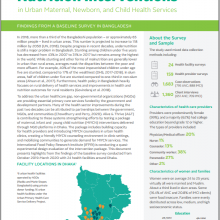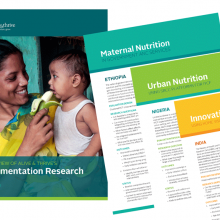Journal article
Jun 28 2022

Process of developing models of maternal nutrition interventions integrated into antenatal care services in Bangladesh, Burkina Faso, Ethiopia and India (Sanghvi, T. Maternal Child Nutrition. 2022)
This paper explores how data was used strategically to integrate a package of nutrition interventions into ANC programs in four countries and engage community members.
Brief
Aug 04 2021
Nutrition and Food Insecurity during the COVID-19 Pandemic: The impact of the pandemic on MIYCN services in India and Bangladesh
This brief summarizes findings of two separate studies in India and Bangladesh, led by the International Food Policy Research Institute (IFPRI) and Alive & Thrive (A&T).
Brief
Jun 08 2021

Nutrition interventions in urban maternal, newborn and child health services: Findings from a baseline survey in Bangladesh
Alive & Thrive (A&T) is contributing to efforts to strengthen urban health systems in Bangladesh by testing a package of maternal, infant and young child nutrition (MIYCN) interventions delivered through NGO platforms in Dhaka.
Brief, Handout
Oct 28 2020

An overview of Alive & Thrive's implementation research
Alive & Thrive's implementation research spans its program areas, seeking to answer "how" to implement effective interventions and policies. Active studies are detailed in the attached documents.
Journal article
Aug 01 2019

Does health worker performance affect clients’ health behaviors? A multilevel analysis from Bangladesh (Epstein, A., 2019. BMC Health Services Research)
In this study, reseearchers found evidence for an association between health worker compliance and client health behaviors; however, small effect sizes suggest that behavior change is multifactorial and affected by factors beyond care quality.
Journal article
May 01 2018

Dietary diversity predicts the adequacy of micronutrient intake in pregnant adolescent girls and women in Bangladesh, but use of the 5-group cutoff poorly identifies individuals with inadequate intake (Nguyen PH., 2018. Journal of Nutrition)
The Minimum Dietary Diversity for Women (MDD-W) indicator based on a 10-food group women dietary diversity score (WDDS-10) has been validated to assess dietary quality in nonpregnant women.

